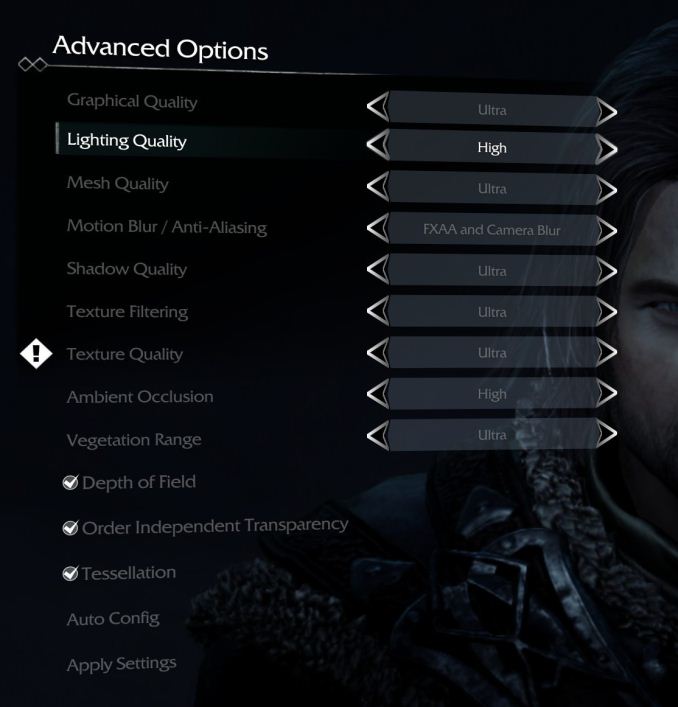The Intel Kaby Lake-X i7 7740X and i5 7640X Review: The New Single-Threaded Champion, OC to 5GHz
by Ian Cutress on July 24, 2017 8:30 AM EST- Posted in
- CPUs
- Intel
- Kaby Lake
- X299
- Basin Falls
- Kaby Lake-X
- i7-7740X
- i5-7640X
Shadow of Mordor
The next title in our testing is a battle of system performance with the open world action-adventure title, Middle Earth: Shadow of Mordor (SoM for short). Produced by Monolith and using the LithTech Jupiter EX engine and numerous detail add-ons, SoM goes for detail and complexity. The main story itself was written by the same writer as Red Dead Redemption, and it received Zero Punctuation’s Game of The Year in 2014.
A 2014 game is fairly old to be testing now, however SoM has a stable code and player base, and can still stress a PC down to the ones and zeroes. At the time, SoM was unique, offering a dynamic screen resolution setting allowing users to render at high resolutions that are then scaled down to the monitor. This form of natural oversampling was designed to let the user experience a truer vision of what the developers wanted, assuming you had the graphics hardware to power it but had a sub-4K monitor.
The title has an in-game benchmark, for which we run with an automated script implement the graphics settings, select the benchmark, and parse the frame-time output which is dumped on the drive. The graphics settings include standard options such as Graphical Quality, Lighting, Mesh, Motion Blur, Shadow Quality, Textures, Vegetation Range, Depth of Field, Transparency and Tessellation. There are standard presets as well.
We run the benchmark at 1080p and a native 4K, using our 4K monitors, at the Ultra preset. Results are averaged across four runs and we report the average frame rate, 99th percentile frame rate, and time under analysis.
For all our results, we show the average frame rate at 1080p first. Mouse over the other graphs underneath to see 99th percentile frame rates and 'Time Under' graphs, as well as results for other resolutions. All of our benchmark results can also be found in our benchmark engine, Bench.
MSI GTX 1080 Gaming 8G Performance

1080p



4K



ASUS GTX 1060 Strix 6GB Performance

1080p



4K



Sapphire R9 Fury 4GB Performance

1080p



4K



Sapphire RX 480 8GB Performance

1080p



4K



Shadow of Mordor Conclusions
Again, a win across the board for Intel, with the Core i7 taking the top spot in pretty much every scenario. AMD isn't that far behind for the most part.












176 Comments
View All Comments
iwod - Monday, July 24, 2017 - link
Intel has 10nm and 7nm by 2020 / 2021. Core Count is basically a solved problem, limited only by price.What we need is a substantial breakthrough in single thread performance. May be there are new material that could bring us 10+Ghz. But those aren't even on the 5 years roadmap.
mapesdhs - Monday, July 24, 2017 - link
That's more down to better sw tech, which alas lags way behind. It needs skills that are largely not taught in current educational establishments.wolfemane - Monday, July 24, 2017 - link
Under Handbrake testing, just above the first graph you state:"Low Quality/Resolution H264: He we transcode a 640x266 H264 rip of a 2 hour film, and change the encoding from Main profile to High profile, using the very-fast preset."
I think you mean to say "HERE we transcode..."
Great article overall. Thank you!
Ian Cutress - Monday, July 24, 2017 - link
Thanks, corrected :)wolfemane - Monday, July 24, 2017 - link
I wish your team would finally add in an edit button to comments! :)On the last graph ENCODING: Handbrake HEVC (4k) you don't list the 1800x, but it is present in the previous two graphs @ LQ and HQ. Was there an issue with the 1800x preventing 4k testing? Quite interested in it's results if you have them.
Ian Cutress - Monday, July 24, 2017 - link
When I first did the HEVC testing for the Ryzen 7 review, there was a slight issue in it running and halfway through I had to change the script because the automation sometimes dropped a result (like the 1800X which I didn't notice until I was 2-3 CPUs down the line). I need to put the 1800X back on anyway for AGESA 1006, which will be in an upcoming article.IanHagen - Monday, July 24, 2017 - link
One thing that caught my eye for a while is how compile tests using GCC or clang show much better results on Ryzen compared to using Microsoft's VS compiler. Phoronix tests clearly shows that. Thus, I cannot really believe yet on Ian's recurring explanation of Ryzen suffering from its victim L3 cache. After all, the 1800X beats the 7700K by a sizable margin when compiling the Linux kernel.Isn't Ryzen relatively poor performance compiling Chromium due to idiosyncrasies of the VS compiler?
Ian Cutress - Monday, July 24, 2017 - link
The VS compiler seems to love L3 cache, then. The 1800X does have 2x threads and 2x cores over the 7700K, accounting for the difference. We saw a -17% drop going from SKL-S with its fully inclusive L3 to SKL-SP with a victim L3, clock for clock.Chromium was the best candidate for a scripted, consistent compile workflow I could roll into our new suite (and runs on Windows). Always open for suggestions that come with an ELI5.
ddriver - Monday, July 24, 2017 - link
So we are married to chromium, because it only compiles with msvc on windows?Or maybe because it is a shitty implementation that for some reason stacks well with intel's offerings?
Pardon my ignorance, I've only been a multi-platform software developer for 8 years, but people who compile stuff a lot usually don't compile chromium all day.
I'd say go GCC or Clang, because those are quality community drive open source compilers that target a variety of platforms, unlike msvc. I mean if you really want to illustrate the usefulness of CPUs for software developers, which at this point is rather doubtful...
Ian Cutress - Monday, July 24, 2017 - link
Again, find me something I can rope into my benchmark suite with an ELI5 guide and I try and find time to look into it. The Chromium test took the best part of 2-3 days to get in a position where it was scripted and repeatable and fit with our workflow - any other options I examined weren't even close. I'm not a computer programmer by day either, hence the ELI5 - just years old knowledge of using Commodore BASIC, batch files, and some C/C++/CUDA in VS.